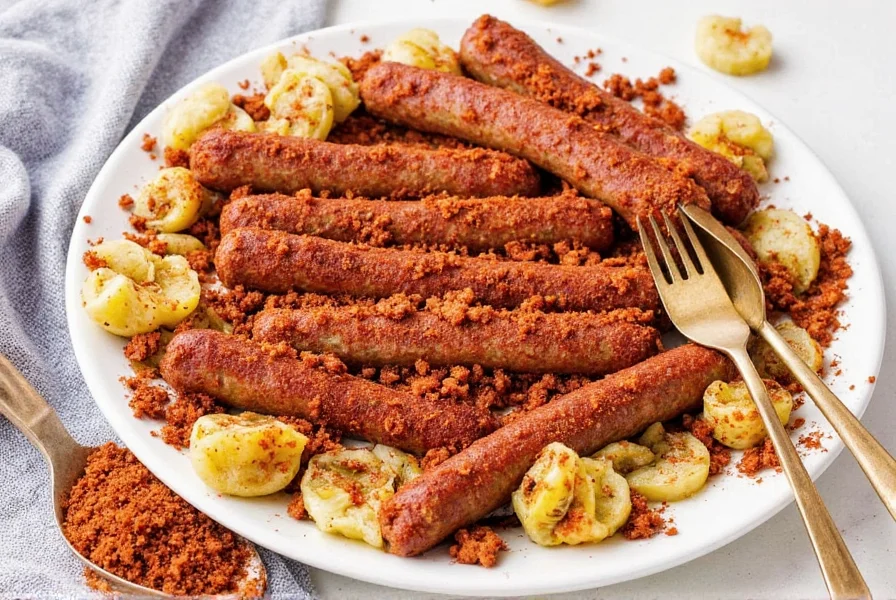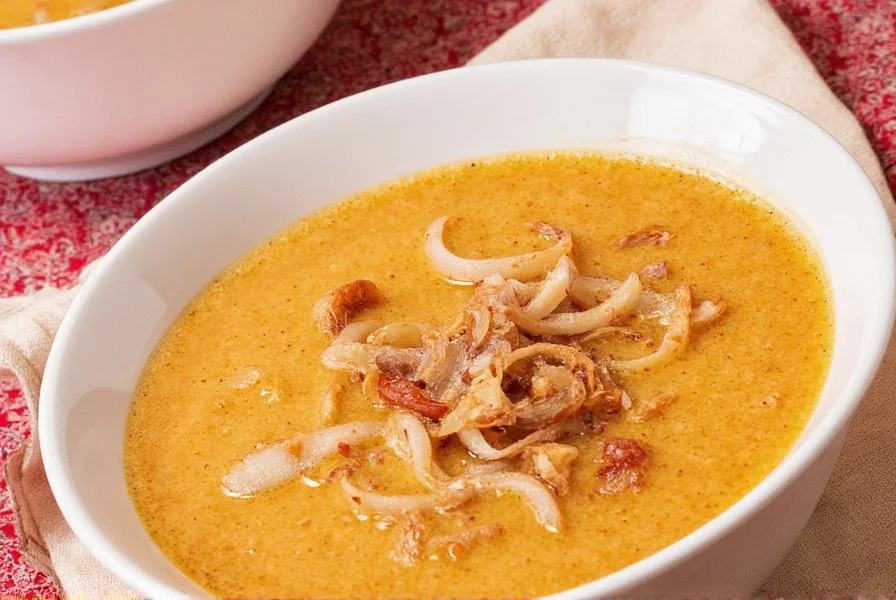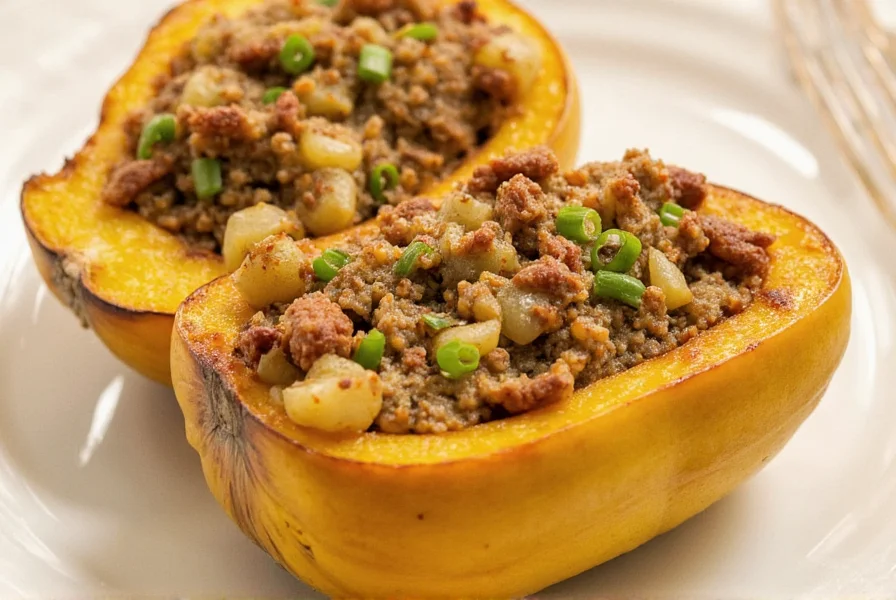This easy homemade chorizo seasoning recipe takes just 10 minutes to prepare and makes enough for 2 lbs of pork. Perfect for tacos, breakfast dishes, and stews. Here's what you need:

Table of Contents
- What Is Chorizo?
- Why Make Your Own Chorizo Seasoning?
- The Best Chorizo Seasoning Recipe
- Key Spices in Chorizo Seasoning
- Buying Guide: Choosing Quality Spices
- Tips & Tricks for Perfect Homemade Chorizo
- Frequently Asked Questions
- Final Thoughts
What Is Chorizo?
Chorizo is more than just a sausage—it's a flavor-packed powerhouse that varies by region and style. Spanish chorizo tends to be dry-cured with paprika, garlic, and vinegar, while Mexican chorizo is usually fresh and crumbly, packed with chili, vinegar, and warming spices. Both are delicious but very different. This recipe focuses on the Mexican-style blend, perfect for tacos, breakfast dishes, and hearty stews.
Why Make Your Own Chorizo Seasoning?
- Control Over Ingredients: You decide what goes into your meat—no preservatives or unwanted fillers.
- Freshness Matters: Freshly ground spices deliver stronger, more vibrant flavors than pre-mixed blends.
- Cost-Effective: Making your own mix is often cheaper per batch than buying pre-seasoned meat.
- Creative Freedom: Adjust heat levels, add unique herbs, or experiment with smoked notes to match your taste buds.

The Best Chorizo Seasoning Recipe
This versatile and flavorful blend makes enough seasoning for 2 lbs (about 1 kg) of pork. Store extra in an airtight container for up to 3 months.
Ingredients
- 2 tbsp smoked paprika
- 1 tbsp chili powder (adjust to taste)
- 1 tsp cumin
- 1 tsp garlic powder
- 1 tsp oregano (preferably Mexican if available)
- ½ tsp cinnamon (yes, really! adds depth)
- ¼ tsp cloves or allspice
- 1 tbsp vinegar (apple cider or white wine work best)
- 1 tsp salt
- ½ tsp black pepper
Instructions
- Gather all your ingredients and ensure your workspace is clean and ready for preparation.
- Mix all dry spices in a small bowl until well combined, making sure there are no clumps.
- Add vinegar to form a thick paste; let sit for 5–10 minutes so the spices bloom and flavors meld together.
- Prepare your pork by ensuring it's coarsely ground (shoulder or belly works great) if not already prepared.
- Rub the spice mixture thoroughly into 2 lbs of pork, making sure to coat all pieces evenly for consistent flavor.
- Let marinate in the fridge for at least 1 hour, preferably overnight, to allow flavors to penetrate deeply.
- Choose your cooking method: stuff into casings for traditional sausages or cook loose as taco filling or crumbles.

| Spice | Flavor Profile | Role in Chorizo |
|---|---|---|
| Smoked Paprika | Earthy, sweet, and smoky | Gives chorizo its signature red color and depth |
| Chili Powder | Spicy and earthy | Provides heat and warmth |
| Cumin | Warm, nutty, peppery | Builds a rich, complex backbone |
| Garlic Powder | Pungent, savory | Boosts umami and sharpness |
| Oregano | Herby, floral, citrusy | Adds brightness and herbaceous note |
| Cinnamon | Sweet, woody, aromatic | Unexpected but essential for balance |
| Cloves / Allspice | Spicy, sweet, intense | Lends a warm, almost exotic undertone |

| Spice | Recommended Brand | Features | Best For |
|---|---|---|---|
| McCormick Smoked Paprika | McCormick | Natural smoke flavor, consistent grind | Traditional chorizo lovers |
| La Flor Chile Ancho Powder | La Flor | Elegant heat, deep red hue | Mexican-style chorizo |
| Frontier Co-op Cumin Seed | Frontier Co-op | Organic, whole seeds for grinding fresh | Home grinders and DIY enthusiasts |
| Spice Islands Garlic Powder | Spice Islands | Strong aroma, no clumps | Bold-flavor seekers |
| Badia Oregano | Badia | Fragrant, robust, authentic Mexican flavor | Authenticity-focused cooks |
| Simply Organic Cinnamon | Simply Organic | Certified organic, rich flavor | Those who love subtle sweetness |
| Mrs. Dash Allspice | Mrs. Dash | Clean label, no additives | Health-conscious home cooks |

Tips & Tricks for Perfect Homemade Chorizo
- Use Freshly Ground Spices: Whole seeds like cumin and allspice should be ground just before use for maximum potency.
- Don't Skip the Vinegar: It helps dissolve the flavors and mimics traditional curing methods without long aging.
- Rest Before Cooking: Letting the meat rest with the seasoning allows deeper flavor penetration.
- Adjust Heat Levels: Start with less chili powder and taste-test after marinating. You can always add more later!
- Try Different Fats: Pork shoulder gives a classic texture, but adding some beef suet or duck fat adds richness and complexity.
- Play with Regional Variations: Add orange zest for a Spanish flair or chipotle powder for extra smokiness.

Frequently Asked Questions
Can I use this seasoning for other meats?
Absolutely! This blend works wonders on chicken, lamb, or even tofu for a vegan twist. The spice profile complements most proteins beautifully.
How do I store leftover seasoning?
Store in an airtight container in a cool, dark place. It will keep well for up to 3 months. For longer storage, you can freeze it for up to 6 months without significant flavor loss.
Is there a substitute for vinegar?
You can use lemon juice or lime juice in a pinch, though it will change the flavor profile slightly. For traditional Spanish-style chorizo, red wine vinegar is ideal.
Can I make this into a dry rub instead?
Yes! Simply omit the vinegar and apply directly to meat before roasting or grilling. This creates a wonderful crust while still delivering authentic chorizo flavor.
How hot is traditional chorizo?
It varies by region. Mexican chorizo can be quite spicy, while Spanish chorizo leans more toward smoky than hot. Adjust the chili level to suit your preference by adding cayenne for more heat or reducing the chili powder.
How long does homemade chorizo last in the refrigerator?
Fresh homemade chorizo lasts 3-4 days in the refrigerator when properly stored in an airtight container. If you've made raw chorizo sausage, cook it within 2 days for best quality and safety.
Can I freeze homemade chorizo?
Yes, you can freeze chorizo for up to 3 months. Wrap portions tightly in plastic wrap and place in freezer bags, removing as much air as possible. Thaw in the refrigerator before cooking for best results.
What's the difference between using fresh garlic vs. garlic powder?
Garlic powder provides consistent flavor distribution and longer shelf stability. Fresh garlic offers a more pungent, immediate flavor but can cause uneven seasoning and may spoil faster. For traditional chorizo, garlic powder is preferred for its reliability.

Final Thoughts
Crafting your own chorizo seasoning is a simple yet rewarding way to bring bold flavors into your kitchen. With just a few pantry staples and a little time, you can create something that tastes better than anything you'll find at the store. Whether you're grilling, stuffing sausages, or spicing up your scrambled eggs, this best chorizo seasoning recipe has got you covered.
Now go forth, season boldly, and enjoy the smoky, spicy magic of homemade chorizo!










 浙公网安备
33010002000092号
浙公网安备
33010002000092号 浙B2-20120091-4
浙B2-20120091-4